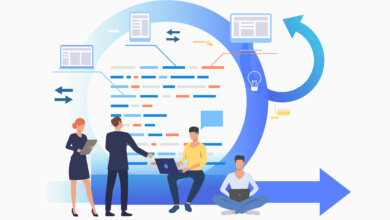Best Kotlin Features to Use in Your Android App
Kotlin has revolutionized Android app development with its concise syntax and immense powers. Kotlin has become the go-to choice for app developers around the globe over Java for creating fast, reliable, and efficient applications. Its compact code, safety features, and built-in capabilities make coding faster and more productive. Kotlin is completely interoperable with Java, so migration becomes smoother and scalability improves. In 2025, Kotlin remains the top language for Android app development. To develop more intelligent apps, it is necessary to learn the new Kotlin features for Android apps. These make the apps less buggy, faster, and better in terms of user experience. In this blog, we will guide you through the best ones to use in your next application.
Why Kotlin For Android Development?
Kotlin is a rapidly growing language of choice for Android development. It is so simple, efficient, and extensively tooled, making it a necessity in modern app projects. Losing no time, Kotlin has a simple syntax and solid IDE support, along with a vibrant community, and helps developers build high-performance applications faster with fewer bugs and greater readability. To fully leverage its potential, it’s important to understand the key Kotlin features for Android apps that make this language stand out. The following are 10 reasons to choose Kotlin in 2025:
1. Open Source
Kotlin is a computer programming language that was created by JetBrains and supported by Google. It is also free and constantly replenished, and it is headed by a large international community. Its developer code is revealed to developers, and they can contribute to its advancement. Kotlin offers an open development process to relish. The abundance of resources in the ecosystem around Kotlin also results in additional learning content, resources, and services.
2. More Convenient, Adaptive Android Development.
The expressive syntax and inherent features like null safety, extension functions, and data classes are viewed as making Android programming more accessible using Kotlin. All these help to ease code complexity and also increase productivity. The programmers will be able to write a more readable, neat, and easy-to-debug and maintain the code. It also allows the use of domain-specific languages (DSLs), providing ease of custom development requirements.
3. Seamlessly Integrated with Android Studio
Android Studio has extensive support for Kotlin projects and has Kotlin as a native language. There is built-in linting, refactoring, and code auto-completion that streamlines the process with efficiency and accuracy. The error checks, along with hints, can be tracked in real-time, and such aspects streamline the accuracy of composing code, in addition to the fact that the aspect of debugging and profiling tools go seamlessly with Kotlin code.
4. Speed:
Kotlin can compile faster, particularly in incremental form, which saves time in development. Lightweight syntax that is also efficient in memory usage and enables applications to be faster and less demanding can also be found in Kotlin. This is especially useful with the creation of MVPs or applications that possess a time factor and whose speed is also a factor.
5. Kotlin is Multi-Platform
Kotlin multiplatform mobile (KMM) allows for cross-platform development in Kotlin; developers can share code for Android, iOS, backends, and websites. KMM achieves benefits from the perspective of reduced duplication, maintenance overhead, and logical consistency and user experience across platforms. KMM can be especially useful for teams that are developing across multiple platforms at the same time.
6. Interoperability with Java
Kotlin is interoperable with Java. Java methods in Kotlin, and Kotlin methods in Java, can be called by developers. For this reason, it is straightforward for developers to start using Kotlin in an existing Java project without needing to rewrite everything in a new language. When gradually integrating Kotlin, teams will be able to reuse the existing Java libraries and frameworks.
7. Reduces Boilerplate Code
Kotlin reduces boilerplate code through such characteristics as data classes, smart casts, and when expressions. Default arguments and named parameters allow us to make method calls shorter and obstacle-free. This leads to less maintenance, fewer bugs, and cleaner code.
8. Increased Code Brevity and Readability
The syntax of Kotlin is very expressive, and it implies programmers will be able to accomplish much with a short amount of code. This increases readability and reduces pain during debugging by making it much easier to write collaboratively. Less code also lowers the time needed to induct new programmers and optimizes long-term maintenance.
9. Maturity and Great IDE Support
Kotlin is an old and stable language, having strong support with IDEs, especially with Android Studio and IntelliJ IDEA. It has intelligent code completion, speed of navigation, and debugging capability. Communities continuously change and enhance their language in order to keep up with the modern trends of development.
10. Improved Safety and Nullability
Kotlin’s null safety feature is one of its highlights. Null checks become compiled-time, and as a result, they provide a lot of mitigation of null pointer exceptions, which are far too common in Java. Smart casting and optional types will ensure safer code, best coding practices, and steadier apps.
Key Kotlin Features for Android Apps
Using Kotlin features and characteristics in Android apps can greatly increase your development speed/efficiency, as well as the quality and performance of what you are developing. These are 11 characteristics that we should all, as Android developers, adopt in the way we build modern, scalable, and maintainable apps in 2025.
1. Brief and Expressive Syntax
The syntax of Kotlin is syntactically clean and concise; it also does not let the programmer write as much boilerplate code as Java does, thereby decreasing mistakes and increasing readability, which makes it easier to write and maintain Android apps.
- Less code means fewer bugs and speed in development.
- Supports type inference for clearer written code.
- Supports default and named arguments, so any function can be called flexibly with the options that they like.
- Supports lambda expressions for functional programming.
- Supports readable and maintainable codebases.
2. Null Safety
NullPointerExceptions are a major cause of crashes in apps. The nullable and non-nullable types provided through Kotlin’s built-in null safety prevent the possibility of null references, which makes apps more stable.
- Variables are non-nullable by default.
- Nullable types require explicit handling with?
- Safe-call operator (?.) prevents crashes
- Elvis operator (?) returns default values.
- Compiler checks minimize runtime null pointer errors.
3. Extension Functions
Extending functions enables you to provide new functionality to all old classes without subclassing Android apps, just as simply and more modularly.
- Add new methods to classes with ease.
- Leave the existing class code the same.
- Organize and reuse code better, and make APIs readable and domain-specific.
- Make third-party libraries better without touching their code.
4. Data Classes
Data classes automatically create utility functions such as equals(), hashCode(), and toString(), so they are great for efficiently modeling app data. Make data-holding class creation easier. Auto-create boilerplate code, Support for destructuring declarations
Good for API responses and UI data models, it improves code readability and maintainability.
5. Kotlin Coroutines for Asynchronous Programming
Kotlin coroutines allow you to work with asynchronous code with ease to help ensure applications remain responsive while executing work in the background, unblocking the UI.
- To make asynchronous code easier with a sequential style
- Prevent callback hell with race conditions
- Provide built-in cancellation and timeout support
- Provide seamless support for the Android lifecycle with suspension
- Improve app performance and user experience
6. Jetpack Compose Integration
The new Android UI toolkit, Jetpack Compose, is also built based on Kotlin, and you can use the more advanced Kotlin capabilities to create declarative UI.
- Develop UI with Kotlin DSL’s concise syntax.
- Enable live previews and rapid iteration.
- Prioritize reusable and modular pieces.
- Minimize XML boilerplate and complexity.
- Make reactive and dynamic UIs easy.
7. Smart Casts
Kotlin smart casts typecheck followed by an implicit cast on immutable variables, cleaner logic, and the elimination of unnecessary casts.
- Prevents manual casting noise
- Makes code safer and easier to read
- Enhanced with Kotlin compiler analysis
- Helpful in conditionals and when expressions
- Simplifies dealing with complicated types
8. Sealed Classes
Sealed classes allow the articulation of bounded classes and are used generally to simulate app states or results whose exhaustiveness can be expressed as when clauses of the kind.
- Model state machines or result types clearly
- Make sure all the cases are processed by the compiler
- Enhance code safety and readability
- Do not use enums for complicated data
- Help keep UI state clean
9. Lazy Initialization and Delegated Properties
Kotlin also provides lazy properties and delegation to optimize the use of the app by postponing initialization until it is needed.
- Lazy by access on the initial access instance
- Delegate property functionality to reusable objects
- Reduce resource usage
- Enhance app startup time
- Keep code simple with built-in delegates
10. Interoperability with Java
Kotlin is based on the JVM and is fully compatible with Java; moreover, the developers can migrate gradually and use available Java libraries in Android applications.
- Combine Kotlin and Java code seamlessly.
- Take advantage of the Java ecosystem and tools
- Migration from Java in stages is possible
- Access huge Java libraries
- Facilitates easier transition for teams
11. Functional Programming Features
Kotlin embraces the idiom of functional programming so that higher-order functions and immutable collections make code more powerful, expressive, and declarative.
- Use functions as first-class citizens.
- Support lambdas, inline functions, and closures
- Utilize collection operations (map, filter, reduce)
- Minimize side effects and enhance testability
- Promote immutable and safer programming styles
The Kotlin features in Android applications will help Android programmers develop cleaner, safer, and more efficient code, which saves on development time as well as enhancing the experience of the user experience. Adoption of these 2025 capabilities will be important to building robust and future-resilient Android applications. Companies seeking to remain competitive need to hire Kotlin developers capable of leveraging these features fully to produce top-notch, scalable mobile solutions.
The Future of Kotlin Development
With Kotlin, the future of Android and cross-platform apps is being shaped. Being continuously supported by JetBrains and Google, it is turning into a need for scalable and high-performance applications. The companies that desire to develop future apps ought to hire Kotlin developers who have knowledge of modern practices like the Kotlin Multiplatform and the clean architecture. With such developers, there would be the capability to reduce the time-to-market as well as improve the long-term maintainability of code. Implementing Kotlin as the main language means long-term benefits to any Android app development company.
It works with the latest Android tools and is well supported by both a community and an IDE. With Kotlin still in the process of growing, the adoption of the language by businesses will give them an edge in terms of performance and productivity in apps and teams.
The future of Kotlin:
- Increased use of Kotlin
- Multiplatform Intelligence will be added to the IDE support and the compiler.
- More Kotlin-first libraries and tooling
- Growing into backend and cloud development
- The Kotlin community expands; no more time to wait to jump on the train.
The Bottom Line
In 2025, Kotlin is the most popular programming language used in Android app development based on its novel syntax, high level of safety, and seamless backward compatibility with Java. By merging the latest functionality of Kotlin as the Android app language, programmers will be capable of creating applications that are considerably more effective and stable, as well as simple to scale and support. In order to enable companies to stay competitive and offer improved user experience, they need to cooperate with an Android app development company that includes credible expertise or hire Kotlin professionals who understand how to utilize these features.
Investing in Kotlin-centered mobile app development services guarantees your app development process is cost-effective, future-proof, and best-practice aligned. It has all the potential to make your Android projects blossom and achieve your vision of innovation and success faster; adopt Kotlin!




